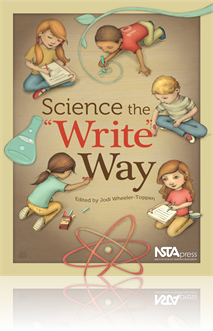All Book Chapters
Book Chapter
Children love seeing their work and photos of themselves at work. Make this an opportunity for an early literacy experience by creating a book about a classroom investigation. Document each step of the process with photographs and student drawings. W...
Book Chapter
One way to help students develop their writing skills is through the “key-word process.” In this method, students select key words about a topic and then use those words to build their own sentences and paragraphs. The key-word process can be exp...
Book Chapter
The communication skills of reading and writing go hand in hand with science as natural partners for fostering students’ understandings of the world. The similarities that exist between reading and writing strategies and science-process skills add ...
Book Chapter
Creative Writing and the Water Cycle
Creative writing provides one strategy for helping students combine their powers of imagination with their arsenal of knowledge. Teachers also can use creative writing exercises to assess student understanding of science content. Use the story, “Th...
Book Chapter
Tired of building a paper mâché volcano to teach about plate tectonics? Do you want to connect science and writing? Then the volcano résumé project is perfect for you. This one-week, problem-based learning (PBL) project requires students to resea...
Book Chapter
That a relatively small piece of writing such as Albert Einstein's three-page paper of relativity could be so important certainly illustrates the significance of writing to science. A science class is not complete unless it helps students learn to th...
Book Chapter
Integrated science journals provide educators with valuable insight into teaching. They allow students to reflect on how engaged they were in learning about a particular topic while also providing information about how successful the teacher was in c...
Book Chapter
Science Interactive Notebooks in the Classroom
Writing is one of the ways in which children learn in science. When students make observations and explain them in writing, they clarify and organize their thoughts and ideas. Keeping science interactive notebooks is a technique for increasing studen...
Book Chapter
Using Science Journals to Encourage All Students to Write
It seems that everyone is using science journals or notebooks lately. As middle school science teachers, the authors use science journals as a tool to enhance students' knowledge and understanding of content and reinforce students' writing skills. In...
Book Chapter
Learning Logs: Writing to Learn, Reading to Assess
Just what do children get out of inquiry? Good inquiry activities help students hone their inquiry abilities and teach them about the nature of science. Inquiry is also a way to teach science content, and teachers need to know if this instruction is ...
Book Chapter
Using Web Logs in the Science Classroom
As educators we must ask ourselves if we are meeting the needs of today’s students. The science world is adapting to our ever-changing society; are the methodology and philosophy of our educational system keeping up? In this chapter, you’ll learn...
Book Chapter
Interactive Reflective Logs: Opening Science Notebooks to Peer and Teacher Feedback
Ho do we as educators ensure that all students are given the opportunity to respond or engage students who are embarrassed to speak in front of others? The authors created an interactive reflective log (IRL) to provide teachers with an opportunity to...
Book Chapter
Students are using the tools of scientists when keeping a science notebook. To bring students’ existing ideas out for examination, the author implemented a “quick-write,” which entails asking an open-ended question and having the students write...
Book Chapter
Science journals are wonderful tools. They offer a glimpse into children’s science understandings, and they are both diagnostic and pedagogically informative to teachers. Examining and reflecting on children’s journal work lets teachers embed ass...
Book Chapter
The P.O.E.T.R.Y. of Science: a Flexible Tool for Assessing Elementary Student Science Journals
Writing about inquiry-based science experiences can provide students with opportunities to communicate their questions, observations, and reflections while expanding our instructional and assessment options as teachers. But how can teachers encourage...



